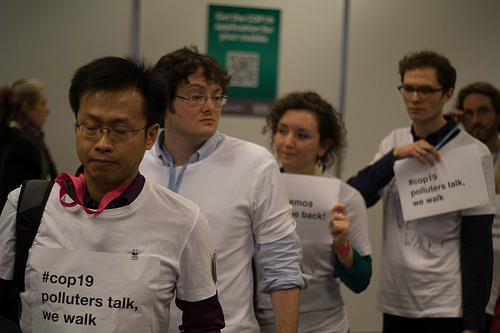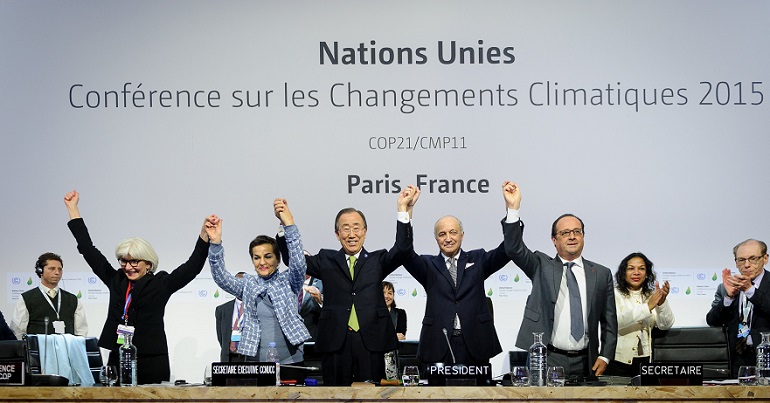COP Captured: time to go beyond government

The corporate sponsorship of the 19th United Nations climate conference, or COP19, was so blatant that it made me thoroughly rethink who rules the world. There were representatives from every government on the planet, packed into the somewhat bizarre football-stadium-come-conference-venue, as well as thousands from Civil Society – businesses, environmental NGOs, gender groups, indigenous leaders, youth delegates and researchers. It became very clear, however, that large, greenhouse gas emitting corporations had been allowed in to the conference well before it had even started. The corridors were filled to the brim with branded products, from shiny red beanbags courtesy of Fly Emirates, to free shoulder bags full of swag paid for by LOTOS Group. And, proudly parked outside the conference venue gates in a large, sparkling glass box sat BMW’s newest gas-guzzling specimen.
The corporate sponsorship was one thing – but it was the corporations present that was most distressing. I was shocked, as a youth delegate attending the talks in order to lobby the UK government to be more ambitious in cutting emissions, at the blatant presence of these fossil fuel companies. Their business models go against solving climate change, or even getting a legally binding Global Treaty that countries are currently working towards. Why should companies that have an agenda in stopping progress be allowed to decorate the venue with their brands?
The role of Civil Society
If corporate influence was present in the conference, the voice of environmental NGOs and youth was not. After nearly two weeks of lobbying governments, planning and staging actions, holding press conferences and sharing expertise on mitigation, technologies, adaptation and campaigning, powerful countries were not listening. Japan backtracked on its previously agreed pledges, while Canada and Australia reached an all-time low in terms of ambition. Few rich countries came forward with the necessary financial pledges to help developing countries adapt to catastrophic climate change.
In fact, the situation became so depressing that on the day before the talks were scheduled to end, environmental NGOs staged a mass walk-out of the conference. We had had enough. After nearly twenty years of failure, we wanted to send a strong signal that inaction on climate change was unacceptable.
And yet the talks still ended with little progress made. As usual, the issue of ‘historical responsibility’ (which countries are historically responsible for most emissions?) became the battle-field, with developed countries refusing to offer the necessary concessions when, historically, they have done the most damage. It’s a battle that has raged for decades and has created deadlock – and meanwhile, the earth has kept warming.
The Lines are Drawn
Where, then, to put our energy – into lobbying the state? Perhaps the corporate sponsorship was good for one thing – it made it plain to see who was behind much of the failure of the talks. The UN is an interesting phenomenon, in that it really is a sort of ritualistic façade of great power, a grand show of puppets and dummies being pulled by corporate lobbyists from behind. We do not live in the era for which the UN was created. Neoliberal capitalism has destroyed the primacy of the state in international relations.
Our focus, then, must shift away from governments and directly towards those actors that are actively destroying the planet and will go on destroying the planet if they are not stopped. I think this is where the fast-growing divestment movement has real potential; we must bankrupt fossil fuel companies morally by shifting investment elsewhere. Research that found 90 companies responsible for nearly two-thirds of emissions puts this in perspective even further – and helps to shift the developing-developed country deadlock that has held up the talks for decades.
University of Edinburgh Rector Peter McColl stated at the official launch of the Fossil Free campaign in the UK: this is our call to arms – to fight the corporations that are responsible for designing a world that makes us dependent on fossil fuels. We must of course go to the UN and lobby our governments – but our main efforts should be on the bigger, more important struggle of stopping large-scale destruction by interests that currently rule the world.
- Flick Monk was a youth delegate to the UN climate change summit in Warsaw this November.



Leave a Reply